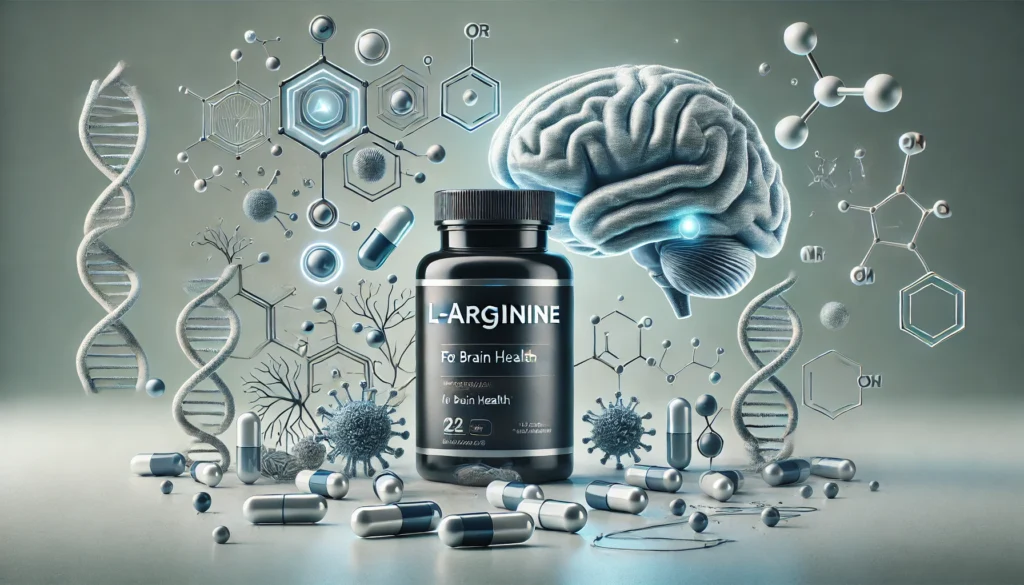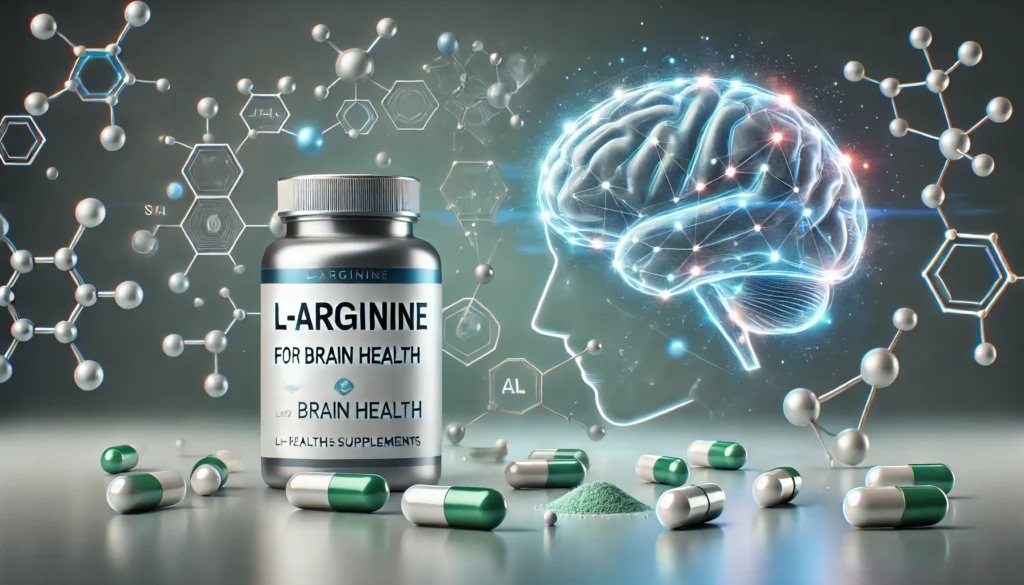L-Arginine is a semi-essential amino acid that has gained prominence in both medical research and the health supplement market for its diverse physiological roles. Known primarily as a precursor to nitric oxide (NO)—a key molecule involved in vascular health—L-Arginine supports a wide array of bodily functions, from protein synthesis and immune modulation to energy metabolism. More recently, it has been investigated for its potential nootropic benefits, offering cognitive enhancements that may aid memory, focus, and neuroprotection.
This comprehensive article delves into the scientific foundation of L-Arginine, covering its chemical properties, mechanisms of action, potential cognitive benefits, recommended dosages, possible side effects, interactions with drugs and supplements, and the risks associated with certain medical conditions.
You May Also Like:
L-Arginine: Potential Nootropic Benefits, Dosage, Side Effects, Interactions, and Other Important Information About This Supplement is an original (NootropicsPlanet) article.
Sources of L-Arginine
L-Arginine can be obtained through both dietary sources and supplementation. The amino acid is abundant in protein-rich foods, particularly those derived from animal sources. Common dietary sources include:
- Animal-based foods: Turkey, chicken, pork loin, beef, eggs, and dairy products.
- Seafood: Tuna, salmon, shrimp, and crab provide moderate amounts of L-Arginine.
- Plant-based foods: Nuts (e.g., peanuts, almonds, and walnuts), seeds (e.g., sunflower and pumpkin seeds), lentils, chickpeas, and soy products.
For those seeking higher doses of L-Arginine or experiencing dietary restrictions, supplementation is widely available. L-Arginine supplements come in several forms, such as L-Arginine hydrochloride and alpha-ketoglutarate, as well as sustained-release formulations designed to prolong its physiological effects.

Chemistry of L-Arginine
L-Arginine is a positively charged, basic amino acid with a guanidino functional group that gives it unique biochemical properties. Its molecular formula is C₆H₁₄N₄O₂. As a precursor for multiple biologically significant molecules, L-Arginine participates in several essential pathways:
- Nitric Oxide Synthesis: L-Arginine is converted into NO via the enzyme nitric oxide synthase (NOS). NO is a potent vasodilator that relaxes vascular smooth muscle, improving blood flow and oxygen delivery.
- Creatine Production: Creatine synthesis involves the combination of L-Arginine, glycine, and methionine, supporting cellular energy production through ATP generation.
- Polyamine Synthesis: Polyamines are critical for cell growth, repair, and protection against oxidative stress.
- Urea Cycle: L-Arginine plays a central role in the urea cycle, which detoxifies ammonia—a byproduct of protein metabolism—by converting it into urea for excretion.
These versatile chemical properties enable L-Arginine to influence various physiological processes, including cardiovascular health, immune defense, and neural function.
Physiological Mechanisms of L-Arginine in the Body and Brain
1. Nitric Oxide Production and Vascular Health
The conversion of L-Arginine to nitric oxide (NO) underpins many of its physiological effects. NO promotes vasodilation, reducing vascular resistance and improving blood flow. This process is particularly significant in tissues with high metabolic demands, such as the brain, where enhanced blood flow supports cognitive performance.
2. Neurotransmission and Synaptic Plasticity
L-Arginine-derived NO acts as a neuromodulator in the central nervous system. It plays a critical role in long-term potentiation (LTP), a neural mechanism underlying learning and memory. By influencing synaptic plasticity, NO enhances communication between neurons.
3. Antioxidant Defense and Neuroprotection
L-Arginine contributes to the synthesis of polyamines, molecules that stabilize cellular membranes and reduce oxidative stress. It also supports the regeneration of other antioxidants, such as glutathione, further protecting neurons from reactive oxygen species (ROS).
4. Stress Response and Hormonal Regulation
L-Arginine modulates the hypothalamic-pituitary-adrenal (HPA) axis, which governs the body’s stress response. Studies suggest that supplementation may help normalize cortisol levels and improve resilience to stress, thereby enhancing mood and cognitive function.

Nootropic Benefits of L-Arginine
Although L-Arginine is not traditionally classified as a nootropic, its biochemical actions suggest significant cognitive benefits. Its influence on cerebral blood flow, antioxidant defense, and energy metabolism demonstrates potential for both immediate cognitive enhancement and long-term brain health. Emerging research highlights its potential for enhancing brain function through several mechanisms:
1. Enhanced Cerebral Blood Flow
L-Arginine’s role in NO production facilitates increased blood flow to the brain, which is essential for optimal cognitive function. Improved cerebral circulation ensures that neurons receive an adequate supply of oxygen and nutrients, supporting processes like memory consolidation, focus, and problem-solving. This increased blood flow may also help buffer the effects of mental fatigue and improve performance during cognitively demanding tasks. Age-related declines in vascular function may be mitigated by L-Arginine supplementation, potentially delaying cognitive impairments associated with aging.
2. Neuroprotective Effects
The brain is highly susceptible to oxidative stress due to its high metabolic activity. L-Arginine helps mitigate oxidative damage by boosting the body’s antioxidant defenses and reducing inflammation. These neuroprotective effects are particularly significant in conditions characterized by chronic oxidative damage, such as neurodegenerative diseases. By preserving neuronal integrity, L-Arginine may support healthy aging and improve resilience against environmental and physiological stressors. This neuroprotection may also benefit individuals exposed to high levels of mental or emotional stress, which can exacerbate oxidative damage in the brain.
3. Cognitive Clarity and Stress Reduction
L-Arginine has been linked to reduced stress and improved mood through its influence on cortisol and other stress-related hormones. By modulating the stress response, L-Arginine may alleviate symptoms of brain fog and enhance mental clarity. Its potential to regulate neurotransmitters such as serotonin and dopamine could further contribute to mood stabilization and sharper cognitive performance. Regular supplementation may help individuals manage the cognitive and emotional effects of chronic stress, providing a natural and effective strategy for improving overall mental wellness.
4. ATP and Energy Metabolism
L-Arginine indirectly supports ATP synthesis through its role in creatine production. Increased energy availability in brain cells can improve cognitive endurance and concentration, particularly during mentally demanding tasks. This enhanced energy supply is critical for neurons, which rely on a steady production of ATP to maintain synaptic activity and communication. Furthermore, the energy-boosting properties of L-Arginine may complement other cognitive enhancers, such as caffeine or L-theanine, creating synergistic effects for sustained focus and mental stamina.
5. Migraine Relief
Preliminary evidence suggests that L-Arginine may reduce the frequency and severity of migraines by improving vascular tone and supporting mitochondrial function. Migraines often impair cognitive performance, and by addressing the vascular component, L-Arginine may alleviate these symptoms. In addition, its potential role in improving mitochondrial efficiency could help reduce the energy deficits observed during migraines, leading to a faster recovery of cognitive clarity. These effects make L-Arginine a promising therapeutic option for individuals whose cognitive abilities are frequently disrupted by migraines.

Dosage and Supplementation Guidelines
General Recommendations
The appropriate dosage of L-Arginine depends on the intended purpose. For general health and vascular support, 3–6 grams per day is typically sufficient. For nootropic purposes or specific conditions, higher doses may be considered:
- Cognitive enhancement: 6–9 grams per day, divided into two or three doses.
- Athletic performance and stress reduction: 9–10 grams per day, tailored to individual tolerance.
- Migraine management: 3–7 grams per day, based on clinical observations.
Forms of L-Arginine Supplements
- Pure L-Arginine Powder or Capsules: Allow precise control over dosage.
- Sustained-Release Formulations: Provide prolonged NO production for steady physiological effects.
- Combinations with Other Nootropics: Often paired with L-Citrulline, which enhances the recycling of L-Arginine, prolonging its benefits.
Side Effects and Safety
L-Arginine is generally well-tolerated, but some individuals may experience mild to moderate side effects, especially at high doses:
- Gastrointestinal Symptoms: Nausea, diarrhea, and abdominal discomfort are the most commonly reported issues.
- Hypotension: Excessive NO production can lower blood pressure, leading to dizziness or fainting in susceptible individuals.
- Headaches: Some users report mild headaches, potentially due to increased blood flow or overstimulation of NO pathways.
- Allergic Reactions: Rare cases of hypersensitivity to L-Arginine supplements may manifest as rash, swelling, or difficulty breathing.

Interactions with Other Supplements and Medications
L-Arginine may interact with several drugs and supplements, requiring careful consideration:
Drug Interactions
- Antihypertensive Medications: L-Arginine may amplify the blood pressure-lowering effects of these drugs, potentially leading to hypotension.
- Nitrates: Combining L-Arginine with nitrates (e.g., nitroglycerin) can cause excessive vasodilation and dangerously low blood pressure.
- Anticoagulants: L-Arginine may influence blood clotting, increasing the risk of bleeding when taken with warfarin or other blood thinners.
- Diabetes Medications: L-Arginine may affect insulin sensitivity, necessitating adjustments in diabetes management.
Supplement Interactions
- L-Citrulline: Often co-administered with L-Arginine to sustain NO production and improve bioavailability.
- Antioxidants (e.g., Vitamin C): Enhance the stability and efficacy of NO, augmenting the benefits of L-Arginine.
- Stimulants (e.g., Caffeine): Caution is advised, as this combination can increase heart rate and anxiety in sensitive individuals.
Risks for Individuals with Certain Health Conditions
While L-Arginine is safe for most people, certain populations should exercise caution:
1. Cardiovascular Disease
Although L-Arginine supports vascular health, individuals with advanced heart failure or low blood pressure should consult a physician before use, as excessive NO production may exacerbate symptoms.
2. Kidney Disease
Impaired renal function may hinder the clearance of L-Arginine, leading to its accumulation and potential toxicity.
3. Herpes Virus Infections
L-Arginine may promote the replication of herpes simplex virus (HSV), increasing the likelihood of outbreaks. Individuals with a history of HSV infections should consider alternative supplements.
4. Liver Disease
Since L-Arginine metabolism occurs in the liver, individuals with liver dysfunction may need to avoid high doses or use supplements under medical supervision.
Conclusion: Should You Consider L-Arginine as a Nootropic?
L-Arginine’s well-documented benefits for vascular health and metabolic support extend into the realm of cognitive enhancement. By improving cerebral blood flow, protecting against oxidative stress, and supporting neurotransmitter function, L-Arginine demonstrates significant potential as a nootropic supplement. However, its efficacy for specific cognitive outcomes, such as memory enhancement or neurodegenerative disease prevention, requires further investigation.
For those seeking a safe and natural way to support brain health, L-Arginine supplementation can be a valuable addition to a holistic wellness regimen. As with any supplement, individuals should consult a healthcare provider to determine the appropriate dosage and assess potential risks based on their medical history and current medications. With responsible use, L-Arginine offers a promising avenue for optimizing cognitive function and overall well-being.

References:
- L-Arginine Exerts Excellent Anti-Stress Effects on Stress-Induced Shortened Lifespan, Cognitive Decline and Depression. Retrieved from: https://pmc.ncbi.nlm.nih.gov/articles/PMC7825557
- The benefits and side effects of L-arginine. Retrieved from: https://www.medicalnewstoday.com/articles/l-arginine
- L-Arginine – Uses, Side Effects, and More. Retrieve from: https://www.webmd.com/vitamins/ai/ingredientmono-875/l-arginineL-arginine: Benefits, Dosage, Side Effects, and More. Retrieved from: https://www.healthline.com/nutrition/l-arginine
- L-Arginine Improves Cognitive Impairment in Hypertensive Frail Older Adults. Retrieved from: https://pmc.ncbi.nlm.nih.gov/articles/PMC9039514/
Important Note: The information contained in this article is for general informational purposes only, and should not be construed as health or medical advice, nor is it intended to diagnose, prevent, treat, or cure any disease or health condition. Before embarking on any diet, fitness regimen, or program of nutritional supplementation, it is advisable to consult your healthcare professional in order to determine its safety and probable efficacy in terms of your individual state of health.
Regarding Nutritional Supplements Or Other Non-Prescription Health Products: If any nutritional supplements or other non-prescription health products are mentioned in the foregoing article, any claims or statements made about them have not been evaluated by the U.S. Food and Drug Administration, and such nutritional supplements or other health products are not intended to diagnose, treat, cure, or prevent any disease.


